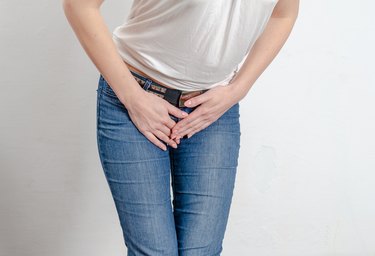
Experts don't believe that eating certain foods can cause a urinary tract infection (UTI). However, some foods and drinks can irritate your bladder and may aggravate the symptoms of an existing UTI. Avoiding bladder irritants may help keep your bladder healthy. Here are some foods to deny with UTI.
Read more: Should You Avoid Certain Foods With a UTI?
Video of the Day
Video of the Day
Foods to Avoid With UTI
What you eat and drink affects what ends up in your bladder. After you eat asparagus, for example, you may notice that your urine smells a little different the next day. That's because urine is made up of extra water and various waste products and toxins — some of which comes from what you put into your body, according to the National Kidney Foundation.
Certain foods are more likely to irritate your bladder, possibly triggering symptoms like an increased urge to urinate or more frequent urination, Mayo Clinic notes. When you have a UTI, it is possible that consuming bladder-irritating foods and beverages may worsen your current symptoms. "We tell people to avoid foods that are bladder irritants, as these can make the UTI symptoms seem worse," says Paula Bellin, MD, a urologist at UMass Memorial Medical Center in Worcester, Massachusetts.
Some people are more sensitive to bladder irritants than others, and different people may be irritated by different foods, Cleveland Clinic. points out.
These foods and beverages are some of the most common culprits of bladder irritation, and you may want to avoid them if you have a sensitive bladder, according to the American Urological Association and the National Institute on Aging:
- Artificial sweeteners.
- Spicy foods.
- Caffeine (coffee, tea, chocolate and many sodas).
- Citrus fruits.
- Alcohol.
What About Sugar and Dairy?
According to the American Urological Association, to maintain a healthy bladder, it may also be beneficial to cut back on your intake of added sugars and refined carbohydrates like:
- White bread.
- Pastries.
- Cookies.
- Candy.
The risk of consuming too much sugar is greater for certain people. In particular, "Sugar can increase the risk of UTIs mostly in patients who [have diabetes] and are prone to elevated urine and blood sugar levels," Bellin says.
The reason? When there is a high level of sugar in urine, UTI-causing bacteria can grow more easily, per the National Kidney Foundation. "Bacteria need nutrients to survive, and sugar can be used as a nutritional source," Bellin says. In other words, don't give the bacteria something to munch on.
Besides the potential for excess sugar to contribute to UTIs in people with diabetes, no one food or type of food will directly cause a UTI, including dairy products like milk or cheese. However, Bellin notes that people who are lactose intolerant and still consume dairy despite the havoc it wreaks on their digestive system may be slightly more at risk for developing a UTI.
"If someone is lactose intolerant, dairy can cause more diarrhea and GI issues, which in turn will increase chances that GI flora can get into the urinary tract and cause an infection," Bellin says.
Diet Tips to Prevent UTI
Staying hydrated is the most foolproof way to help prevent UTIs and relieve symptoms of an existing UTI. Aim for six to eight 8-ounce glasses of liquid per day, mostly water, according to the National Institute of Diabetes and Digestive and Kidney Diseases (NIDDK).
There is some evidence that cranberry products, like unsweetened cranberry juice or cranberry pills, can help you ward off UTIs, per NIDDK. "Cranberry products are high in PACs (proanthocyanidins), and PACs make it harder for certain bacteria to adhere to the bladder wall," Bellin says. However, research on cranberry products' preventive benefits is still ongoing, and there is certainly no evidence that they will treat an existing UTI.
Other potential preventive foods and supplements have less evidence on their side. Some say that probiotic foods like yogurt — or probiotic supplements — may help prevent UTIs by promoting the growth of "good" bacteria in the vagina and keeping "bad" bacteria at bay. Increasing your intake of vitamin C may also help by making your urine more acidic and less favorable to bacterial growth, according to Johns Hopkins Medicine.
Just as nothing you can eat or drink is proven to cause UTIs, there are no dietary changes you can make to prevent them definitively.
- National Kidney Foundation: "What Your Pee Says About Your Health"
- Mayo Clinic: “Bladder Control: Lifestyle Strategies Ease Problems”
- Paula Bellin, MD, urologist, UMass Memorial Medical Center; assistant professor, University of Massachusetts Medical School, Worcester
- Cleveland Clinic: “Bladder-Irritating Foods”
- American Urological Association: “10 Healthy Tips for Urologic Health”
- National Institute on Aging: “13 Tips to Keep Your Bladder Healthy”
- National Kidney Foundation: “Diabetes - A Major Risk Factor for Kidney Disease”
- National Institute of Diabetes and Digestive and Kidney Diseases: “Can My Eating, Diet, and Nutrition Help Prevent Bladder Infections?”
- Johns Hopkins Medicine: "Urinary Tract Infections"
Is this an emergency? If you are experiencing serious medical symptoms, please see the National Library of Medicine’s list of signs you need emergency medical attention or call 911.